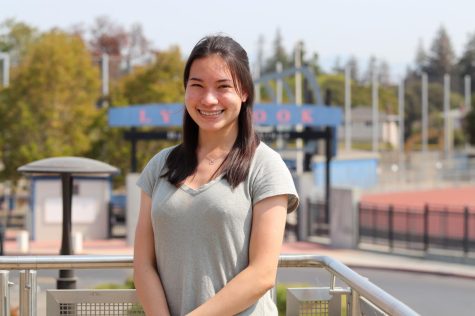Losing myself in the race against time
Graphic Illustration by Sharlene Chen
Since entering high school, I’ve always felt like I never have enough time.
May 26, 2022
Since entering high school, I’ve always felt like I never have enough time. Every day is a race against the clock, with barely enough hours in the day for all my obligations, let alone things I want to do; movies on my must-watch list have remained there since freshman year, trumped either by physics homework or my self-sabotaging brain guilt-tripping me for even considering leisure over study. I wish I could say that I successfully managed to find a balance between sleep, school and social life during my four years at Lynbrook, but in reality I am still trying to find that perfect equilibrium.
Like many other students, I grew up with the notion that being productive is the only worthwhile way of spending one’s time. Outside of school, I was pushed to attend music lessons, dance classes and summer camps instead of coming home with endless time on my hands. I am undoubtedly grateful for these experiences because they have shaped my love for the arts and gave me happy childhood memories, but I also wish I had developed a healthy work-life balance earlier on.
As my workload in high school increased over the years, I tended to feel guilty when I chose to spend free time relaxing or socializing instead of studying or getting ahead on work. Yet, when I felt overwhelmed with assignments and extracurriculars, I wanted nothing more than time to breathe and do nothing at all. This created a constant back-and-forth, internal battle with myself, trying and failing to find a good balance, and I often felt shame for not having established it while so many of my peers appeared to successfully cope.
When the pandemic hit in sophomore year, I could finally afford several hours in the day to myself, and I pledged to use this time to my advantage by trying to become a better, more productive person. I established a routine work schedule from morning to night, taught myself how to crochet, attempted to learn guitar and went on multiple walks a day, because I believed successful people did that. The fifteen minute intervals I allowed myself between “work blocks” was my version of a work-life balance. But I failed to realize that I was still trapped by my restrictive notion of time; every day I created a timetable outlining how many minutes I could afford to spend on each activity, which made “unstructured leisure” still ultimately limited.
Ironically, finally getting to one of those must-watch movies on my list helped me realize my problem. In the 2011 sci-fi film In Time, the rich and poor lead extremely distinct lives within a futuristic society where time is literally money, and having zero time left equals death. The poor rarely have more than a day’s worth of time on their personal clocks, giving them a short margin to work and earn more hours, while the extremely wealthy who live in higher-up “time zones” can essentially live forever with centuries on their time clocks. In the movie, a wealthy citizen’s daughter falls in love with the poor main character, and they discover that love transcends time zones and is ultimately more worthwhile than futilely looking into the ticking time bomb of the future.
Although an arguably cheesy romantic trope, this reality became more and more evident in my own life. I was still 17 years old; why was I constantly jumping from one minute to the next, panicking about falling behind in my schedule and acting as if I, too, had only a set amount of hours to live? Suddenly, the quote “If you don’t stop to look around sometimes, life is going to pass you by” didn’t make me roll my eyes anymore; instead, it scared me because I realized that I could hardly remember all the times over the previous years I’d intentionally taken time to do something for myself instead of put work first.
When senior year began, I lost the rigidity of routine I’d built during online school and started to feel the creeping effects of productivity guilt again. Yet, I realized that it was my last year to fight this problem and regain control over my time. I made it a goal to attend as many school-wide events as possible, as well as push myself to do something fun and relaxing every Friday night.
Instead of losing time, this helped me mentally prepare to work during the weekend, and also made me feel more excited about waking up each morning as I learned to accept that a self-care day was as “productive” as one spent studying. As my second semester winds to an end, I again have more free time than before on my hands, but I am slowly getting better at learning to cherish that time instead of feeling guilty about having it in the first place.
I am now 18 years old, and although I still have not found that perfect three-point equilibrium between sleep, school and social life that I always believed came automatically with adulthood, I have accepted that maybe that balance doesn’t exist; instead, I need to recognize that it may be never be constant. Life is about so much more than filling our days with one activity to the next; there is time only for what is truly valuable, and I value my family, friends and the remaining time I get to spend with them before graduating and leaving this version of myself behind.
Although my four years of high school did not culminate in finding that ideal balance, I did manage to reverse my former toxic notions of constant productivity and learn to live and breathe in the present instead — free from the clutches of a nonexistent personal clock.




























































